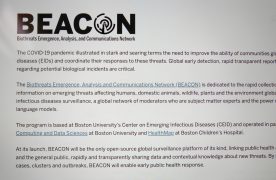Resulting from the events of Sept. 11 and the country’s heightened security, the approximately 4,450 international students at Boston University will soon find themselves listed in a new, unique software database, with any changes to their curriculum or housing recorded and sent to the Immigration and Naturalization Service.
Though this action is not a major change from previous years for BU, it becomes more important with increased security measures since the terrorist attacks. Hani Hajour, one of the hijackers of American Airlines Flight 77 had entered the United States on a student visa but never attended class.
Less than two months after Sept. 11, Congress passed the USA Patriot Act, requiring all schools to implement a Student and Exchange Visitor Information System (SEVIS) to track international students. Any school not complying with this act by Jan. 30, 2003 will not be allowed to accept international students.
A Cambridge-based software company, Newfront Software, is the creator of fsaATLAS, a tracking software to help schools comply with these SEVIS requirements, and has thrived in the recent increased demand for its services.
The program’s functions are simple. Any change to an international student’s record at any of Newfront’s clients’ schools, such as address, major or enrollment status, will automatically be pushed from the campus database to Newfront’s product, fsaATLAS. Once implemented, the SEVIS system will automatically report the necessary information to the INS.
“We basically let [schools] continue to use their existing system, but ensure they keep compliant with federal regulations,” said Andy Barrett, senior sales executive at Newfront.
With more than seven years of experience and little competition, Newfront has emerged at the forefront of its field, with many employees from international student advising backgrounds and an on-staff immigration attorney, Barrett said.
“The software is efficient, less paper based and gives government agencies better access to information,” he said.
With this information, the INS can more easily scrutinize the backgrounds of international students for suspicious motives. The organization monitors where the student has traveled. It also crosschecks with several “watch lists” from other government agencies. In addition, INS looks for suspicious sources of funding for students’ education, according to Elizabeth Goss, founding partner of Newfront Software.
Once students have entered the country, the INS receives demographic information; however, the primary goal of the SEVIS system is to ensure they continue with their classes and do not simply “disappear.”
“It’s not hard for someone to come into the country and slip out of sight if they wanted to,” Goss said.
“Basically, the INS wants to know who is here and what they’re doing,” said Greg Leonard, director of the International Students and Scholars Office at BU. “As long as they’re doing what they’re supposed to be doing, everything should be fine.”
BU has been using fsaATLAS for about four years in both the ISSO and the Center for English Language and Orientation Programs, according to Leonard. Because of the complexity and immensity of BU’s international population, Leonard said the University probably will not completely switch to SEVIS until late 2002.
“Because the changes mandated by federal law and regulation are so pervasive, they are going to significantly change the way all schools handle their international student and exchange visitor matters,” Leonard said.
According to Barrett, the price of fsaATLAS begins at $18,000, with a 20 percent standard yearly renewal cost. This is not a significant expense given its value, Leonard said.
“It is a small part of our budget and is definitely worth the expense,” Leonard said. “We could not function without it.”
However, for smaller schools with a smaller international population, the cost of software like this could be a great expense.
Although Leonard says the number of international applicants has not declined in the past year, many are experiencing delays in the process, due to security clearance policies and procedures. Goss said these holdups could potentially deter them from studying in the United States.
“I think that students will think twice if they face delays,” Goss said. “The most impacted area will be the English language schools. The UK and Australia, and even Canada will vie for those students.”
Barrett stressed the urgency for schools to take action to become compliant with SEVIS with the approaching deadline.
“This issue will not go away,” he said. “With about 7,500 institutions in the United States with international students, we may have to turn people away.”
This is an account occasionally used by the Daily Free Press editors to post archived posts from previous iterations of the site or otherwise for special circumstance publications. See authorship info on the byline at the top of the page.












